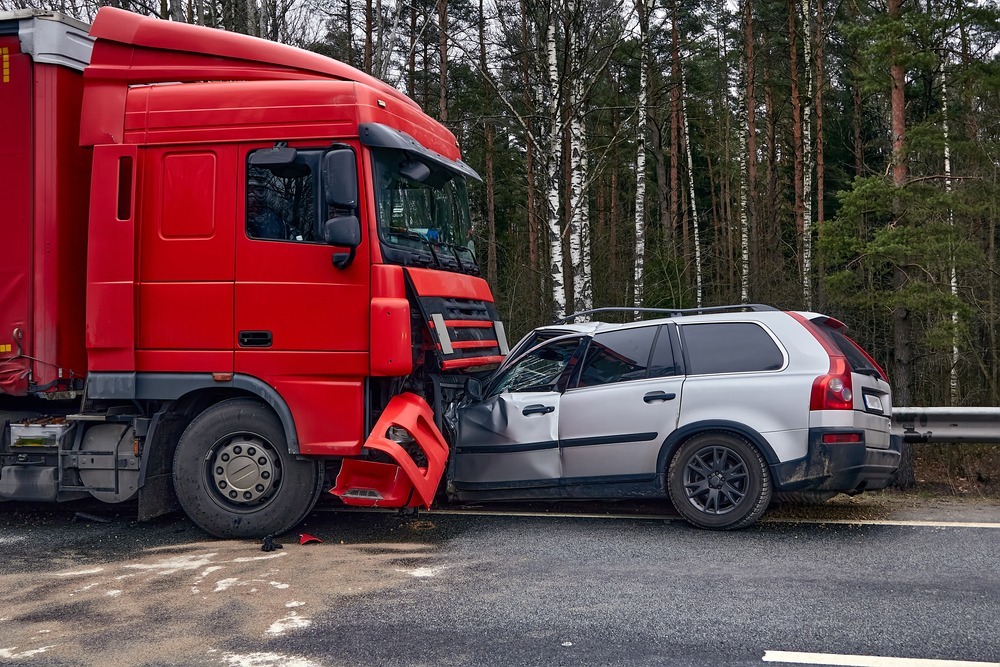Essential Questions Your Truck Accident Attorney Must Answer (2025 Guide)
With over 500,000 crashes involving large trucks reported annually by the Federal Motor Carrier Safety Administration, finding the right truck accident attorney after a collision can be crucial to your recovery and compensation. Unlike standard vehicle accidents, truck collisions involve unique federal regulations, multiple potentially liable parties, and corporate defense teams determined to minimize payouts.
When searching for a truck accident attorney near you in locations like Houston, Atlanta, or Los Angeles, you need someone with specialized experience. Some legal teams have accumulated over 200 years of combined experience handling these complex cases. Additionally, in the aftermath of a truck accident, you likely face overwhelming challenges including mounting medical bills and complicated insurance claims. Because truck accidents aren’t simply “bigger” car accidents, your choice of legal representation can significantly impact your case outcome.
This comprehensive guide outlines the essential questions you must ask before hiring a truck accident attorney in 2025. By the end, you’ll understand how to evaluate their expertise, communication style, fee structure, and ultimately determine if they’re the right advocate to fight for the compensation you deserve.
Understanding the Role of a Truck Accident Attorney

Image Source: Atlanta Personal Injury Lawyer
After a collision with an 80,000-pound commercial truck, you need more than just any legal representation. The complex nature of these cases demands specialized knowledge that general practice attorneys simply don’t possess.
1. Why specialized experience in truck accidents matters
Choosing a truck accident attorney with specific expertise can dramatically alter your case outcome. Commercial truck collisions differ fundamentally from passenger vehicle accidents due to the extensive damage and severe injuries they typically cause. Furthermore, these cases involve higher financial stakes, as trucking companies carry much larger liability insurance policies. Your truck accident attorney must understand how to investigate these complex cases, identify all potentially responsible parties, and maximize your compensation potential.
2. What makes a truck accident lawyer different from a car accident lawyer
While car accident lawyers handle vehicle collisions, a dedicated truck accident attorney possesses specialized knowledge about the commercial trucking industry. The key difference lies in their understanding of liability – truck accidents often involve multiple responsible parties beyond just the driver. These may include the trucking company, vehicle owners, maintenance providers, cargo loaders, and even manufacturers. Consequently, your lawyer must know how to investigate maintenance records, driver logs, and company policies to build a comprehensive case against all negligent parties.
3. How federal regulations impact your case
The trucking industry operates under strict federal regulations that ordinary car accident attorneys might not fully comprehend. The Federal Motor Carrier Safety Administration (FMCSA) sets specific rules governing hours of service, vehicle maintenance, driver qualifications, and cargo securement. Violations of these regulations can serve as powerful evidence of negligence in your case. A skilled truck accident attorney will meticulously examine electronic logging devices, black box data, and maintenance records to identify any regulatory breaches. Moreover, these violations can significantly strengthen your claim and potentially increase your compensation.
By understanding these crucial aspects of a truck accident attorney’s role, you’ll be better equipped to find the right legal advocate for your specific situation.
Key Questions to Ask During Your Consultation

Image Source: Atlanta Personal Injury Lawyer
The consultation with a potential truck accident attorney offers a crucial opportunity to evaluate their expertise. Asking the right questions can help determine if they’re qualified to handle your specific case.
1. What percentage of your practice is truck accident cases?
When interviewing potential legal representation, first ask about their specialization level. Some firms dedicate nearly 95% of their practice exclusively to representing semi-truck accident victims. This focus matters since attorneys handling primarily truck accidents possess deeper understanding of the complexities involved. Certainly, many lawyers claim truck accident experience, yet only a few have genuine expertise in these complicated claims. Request specifics about their case distribution rather than accepting vague assurances about general experience.
2. Have you taken truck accident cases to trial?
Although approximately 3-5% of truck accident cases actually proceed to trial, this question reveals much about an attorney’s capabilities. Insurance companies often prefer settlements to avoid the uncertainty of trial outcomes. Still, a truck accident attorney prepared to go to trial generally secures better settlements. According to research, clients with attorney representation received settlements 40% higher than those without legal representation. Look for a lawyer with actual courtroom experience who isn’t just focused on quick settlements that primarily serve their internal pressures.
3. How do you investigate commercial truck accidents?
Thorough investigation distinguishes exceptional truck accident attorneys. Qualified lawyers should explain how they collect evidence from the accident scene, obtain police reports, request black box data, examine trucking company records, interview witnesses, consult experts, inspect the truck, and gather medical documentation. Especially important is their process for preserving critical evidence like vehicle maintenance records and driver logs that companies might legally destroy within weeks. Ask if they work with accident reconstruction professionals.
4. Who will handle my case day-to-day?
Finally, determine exactly who will manage your case. Many firms assign junior associates or paralegals to handle routine matters. A solid working relationship with your truck accident attorney is essential for success. The ideal lawyer responds quickly to questions and provides regular updates throughout your claim process. Consider both their availability to discuss your case and ability to explain complex legal terms clearly.
Evaluating Communication, Fees, and Case Value

Image Source: Beach Accident Attorneys
Beyond expertise and experience, successful outcomes in truck accident cases depend heavily on clear communication and proper financial arrangements with your truck accident attorney.
1. How will you keep me informed throughout the case?
Effective communication becomes vital in truck accident cases due to their complexity and extended timeframes. Ask potential attorneys about their communication policies, including update frequency, preferred contact methods, and typical response times. Inquire whether you’ll be working primarily with the attorney you meet during consultation or if associates will handle day-to-day matters. Some firms might delegate routine tasks, so understanding who makes major decisions and manages communications is essential.
2. What is your fee structure and do you work on contingency?
Most reputable truck accident attorneys work on a contingency fee basis, meaning you pay nothing upfront. The percentage typically ranges from 33.3% to 40% of your settlement or verdict. This arrangement allows you to secure legal representation without worrying about costs while ensuring your lawyer is motivated to win. Additionally, clarify what case expenses you might be responsible for and whether these costs are deducted before or after the attorney’s percentage.
3. How do you calculate the value of a truck accident claim?
A qualified truck accident attorney should explain how they assess your case value based on several factors: injury severity, permanent damages, liability determination, and evidence strength. Some lawyers use formulas that multiply medical expenses by a predetermined multiplier, then add other recoverable damages. The total should account for medical costs, lost income, property damage, and non-economic damages like pain and suffering.
4. What challenges do you foresee in my case?
Truck accident claims face unique obstacles that can affect outcomes. Your attorney should identify potential issues like comparative fault laws that might reduce compensation if you’re partially responsible for the accident. Other common challenges include dealing with powerful trucking company defense teams and navigating complex federal regulations.
Assessing Credibility and Red Flags
Thoroughly vetting your prospective truck accident attorney requires looking beyond their promises and credentials.
1. Can you provide client testimonials or references?
First and foremost, ask for specific feedback from past clients with similar cases. Third-party platforms typically offer more unfiltered reviews than curated testimonials on a firm’s website. Focus on reviews that mention truck or commercial vehicle accidents specifically, not just generic praise. Look for details about communication, responsiveness during stressful moments, and how the truck accident attorney handled challenges throughout the case.
2. What red flags should I watch for when hiring a truck accident attorney?
Unfortunately, not all lawyers deliver what they promise. Watch for these warning signs:
- Unrealistic guarantees about case outcomes or specific settlement amounts
- Vague or unclear fee structures and payment terms
- Pressure to settle quickly without thorough case review
- No clear strategy or seemingly uncertain about handling your case
- Lack of trial experience, indicating they might settle for less
- Unprofessional behavior during consultations
3. How do you handle negotiations with insurance companies?
Insurance adjusters handle claims efficiently and aim to pay as little as possible. A qualified truck accident attorney should outline their negotiation approach, including how they counter low-ball offers with facts and reasoning. They should explain how they’ll protect you from recorded statements, arrange independent medical examinations if needed, and redirect all insurance communications through their office.
Conclusion
Finding the right truck accident attorney certainly makes a significant difference in the outcome of your case. Throughout this guide, we’ve explored why specialized expertise matters when dealing with commercial trucking collisions. Unlike regular car accidents, truck cases involve complex federal regulations, multiple liable parties, and corporate defense teams determined to minimize payouts.
Therefore, asking the right questions during your initial consultation becomes essential. Questions about experience percentages, trial history, investigation methods, and day-to-day case management help you evaluate whether a potential truck accident attorney truly possesses the specialized knowledge your situation demands.
Additionally, clear communication expectations, transparent fee structures, and realistic case value assessments should factor into your decision-making process. A qualified truck accident attorney will explain potential challenges specific to your case without making unrealistic promises about outcomes.
Above all, remember that your choice of legal representation directly impacts your compensation and recovery journey. Red flags such as vague fee structures, pressure to settle quickly, or lack of trial experience should prompt you to continue your search. Client testimonials, especially those mentioning commercial vehicle accidents specifically, offer valuable insights into an attorney’s actual performance.
The aftermath of a truck accident undoubtedly brings overwhelming challenges. Nevertheless, armed with these essential questions, you can confidently evaluate potential attorneys and choose the right truck accident attorney to advocate for the full compensation you deserve.
Key Takeaways
When choosing legal representation after a truck accident, asking the right questions during consultation can mean the difference between adequate and exceptional outcomes for your case.
• Prioritize specialization over general experience – Look for attorneys who dedicate 90%+ of their practice to truck accidents, as these cases involve unique federal regulations and multiple liable parties that general lawyers don’t fully understand.
• Verify trial readiness and negotiation strength – Ask if they’ve taken truck cases to trial; attorneys prepared for court typically secure 40% higher settlements than those focused only on quick resolutions.
• Confirm contingency fee structure and transparent communication – Most reputable truck accident attorneys work on 33-40% contingency fees with no upfront costs, plus should provide clear update schedules and direct access throughout your case.
• Watch for red flags during consultation – Avoid attorneys who make unrealistic settlement guarantees, pressure quick settlements, have vague fee structures, or lack specific truck accident trial experience.
• Demand thorough investigation capabilities – Your attorney should explain how they’ll preserve critical evidence like black box data and maintenance records, work with accident reconstruction experts, and identify all potentially responsible parties beyond just the driver.
The complexity of truck accident cases requires specialized legal expertise that goes far beyond standard car accident representation. By asking these essential questions, you’ll identify an attorney equipped to navigate federal trucking regulations, counter corporate defense teams, and maximize your compensation potential.
FAQs
Q1. What makes truck accident cases different from car accident cases?
Truck accident cases involve unique federal regulations, multiple potentially liable parties, and corporate defense teams. They often result in more severe injuries and higher financial stakes due to larger insurance policies carried by trucking companies.
Q2. How do I choose the right truck accident attorney?
Look for an attorney who specializes in truck accidents, has trial experience, and can explain their investigation process. Ask about their communication style, fee structure, and how they calculate case value. Also, request client testimonials and be wary of red flags like unrealistic guarantees.
Q3. What percentage of truck accident cases go to trial?
Approximately 3-5% of truck accident cases actually go to trial. However, having an attorney prepared for trial often leads to better settlement offers from insurance companies.
Q4. How are truck accident attorneys typically paid?
Most reputable truck accident attorneys work on a contingency fee basis, meaning you pay nothing upfront. The fee is usually 33.3% to 40% of your settlement or verdict, taken only if you win your case.
Q5. What kind of compensation can I expect from a truck accident case?
Compensation in truck accident cases can include medical costs, lost income, property damage, and non-economic damages like pain and suffering. The exact value depends on factors such as injury severity, permanent damages, liability determination, and evidence strength.

Leave a Reply